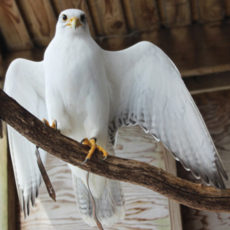Announcements

Green Chimneys is grateful to those dedicated to The Sam and Myra Ross Institute, providing their expertise in guiding the development of The Institute’s education and advocacy activities, and their support for outreach and the dissemination of meaningful data and content.
Kristin Dionne
Maureen Doherty
Michael Kaufmann, Institute Director
Miyako Kinoshita
Kristin Licardi
Denise Luft
Christopher Platt, Committee Chair
Michelle Greenberg
Paul Kupchok, Jr.
Dr. Michael Otten

Crowned the best for falconry in medieval times, gyrfalcons were once reserved for kings. As the largest falcon in the world, with exquisite plumage ranging from bright white to deep charcoal, gyrs are revered for their powerful skill of flight. Their long wings make hunting waterfowl from 3,000-feet-high a feasible and fantastical feat. This falcon was flown in the sport of falconry for several years.